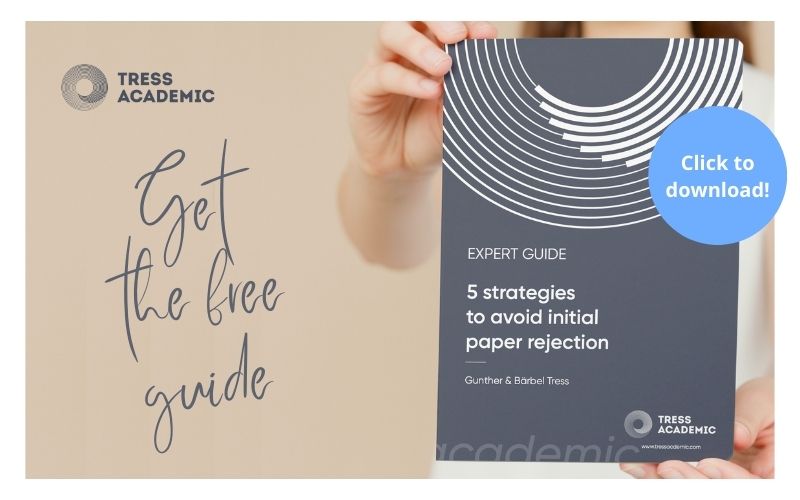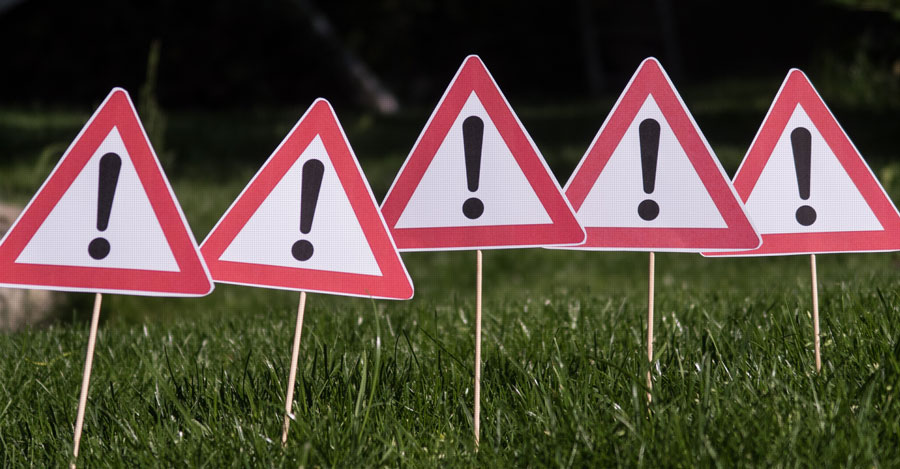Are you satisfied with how you approach writing journal papers? Great, keep going as you are. If you are not happy, why is that? Or, do you think this is inevitable, that everybody has difficulties with writing journal papers? Well, this certainly doesn’t have to be the case! In this blog, we’ll make you aware of 5 warning signs that indicate that something is going wrong in the way you write papers so you can successfully change your writing approach.
How do you write papers?
Writing journal papers to present your valuable research to your peers is simply part of the job as a researcher, along with teaching and conducting the research itself. The question is how much time and energy do you have to invest to reach this point?
Below we describe 5 warning signs that, if they pop up during your writing, signal you need to change something in the way you approach writing papers. If any of these crop up, think about what you can do to combat them – there is always a way to fix it and sometimes help is just around the corner.
Warning Sign #1: It takes you a very long time to write a paper
Are you satisfied with the progress you are making with your paper? Do you see that it is developing and ticking along, or are you dreading the endless cycles of rewriting? Are you wondering how to write the literature review? Are you are still not sure what to present from your results? And are you almost afraid of drafting ideas for the discussion because you don’t know what to say? You’re adding a section here and cutting something out there, but it doesn’t feel like the paper gets any better. If this is the case, writing a paper can start to feel like a dull duty that you have to fulfil, and it certainly isn’t something you look forward to completing.
If time is passing like this and you don’t feel that you are making any progress, you are probably lacking focus and guidance on how to get the paper done. If you keep going in this way, it will take you months, perhaps even half a year to get it done, which means you will almost definitely lose all the interest in it.
When it takes you half a year or even longer to get something written, it will slip down your priority list. Realistically, it only needs to take you a couple of weeks to get a good paper together, but when you spend six months or more on it, you make life extra hard for yourself. But this is certainly not the way it has to feel when writing a paper! Try to readjust the focus on your work and follow a clear and straightforward plan for what to write, and you will see it will take you less time to write it.
What you need is to set up a paper-writing plan to guide you in your writing process. Then you will always know what the next step is, how long it will take, and how to move on.
Warning Sign #2: You don’t like writing papers
When you think about having to write a paper, is this the moment the headache starts? Would you rather be starting a new project, writing a new proposal, going on a field trip or even just tidying up your office – anything but writing a paper?
When talking to students on our paper-writing courses, it is not unusual for someone to confess that they “hate paper-writing” and they do it “only because they have to”, so we know that some of you feel this way too.
We are always happy when students open up and tell us how they feel. They often say that they don’t like the paper-writing job for a multitude of reasons: it takes too long; there is no immediate success; so much of the process is unclear to them; they don’t know how to write it; and they are unsure of what they can expect from their co-authors. More than anything, they are afraid of what the journal might say when the paper is finally submitted. It is a collection of “what-if’’s and “but”s that seem to foster a lot of pain and anxiety.
Do you feel the same? Is paper writing for you also a painful process that leads to headaches and frustration? Trust us, we’ve experienced it ourselves so we know how this feels. But often, the feeling that you don’t like writing papers is actually just a sign that you feel uncertainty about how the process of writing and submitting actually works. That’s not to say you have to necessarily enjoy the process, but it doesn’t have to be a painful one at all.
All you need is a clear overview of the process of paper-writing, its challenges and pitfalls and how to navigate around them. Once you’re done, you will find out that paper-writing can be a really fun process because you’ve produced something that wouldn’t be there without your input; without your research. It can be a very rewarding practice.
Warning Sign #3: You try to avoid writing the introduction
“Oh no, the introduction is the most boring part to write. I have no idea what to put in it. I usually do it at the end!” Sound familiar? We sometimes hear statements like this from students on our courses.
Are these statements that you agree with? Do you also wait to write the introduction until the very end? And do you also just write the introduction because you think there has to be one? Do you think that your introduction is boring?
If you feel like this, you should definitely reconsider your writing approach! If you have done great research, i.e. you worked on an interesting and relevant question and you got good results to show to your peers, then writing the introduction should be a pleasure. There is no need for blah blah blah and repeating statements that everybody knows already. In the introduction, you lay the groundwork for the good things to come in your paper.
All you need is to reconsider what needs to be said in the introduction; what function it has. If you have good and relevant research and get the introduction right, your paper has a high chance of getting published. Don’t leave it to the end to write the introduction, but rather start with this section. Everything else will then be so much easier.

Warning Sign #4: You postpone the submission of your paper
Do you know when it’s time to submit? When you write a paper, do you reach the point where you feel that you have done everything you need to do and now it’s ready for submission? Is this a mindful decision or are you unsure about this step?
Ideally, you should know when you have a finished draft in hand that is ready to be submitted. If you have completed all the necessary steps in writing and editing a good paper and your co-authors have given their input, then the next natural step should be handing your paper to the journal. You have done all that was necessary.
However, if you are not so sure whether you have done everything you needed do and therefore hold off submission, you’re delaying your paper. On top of that, you will start to second-guess the quality and clarity of your work.
All you need is a clear overview of the requirements of a good paper and double-check yourself, and with your co-authors, whether the paper lives up to these requirements. Once you have checked everything, you can submit with confidence and look forward to the next steps.

Warning Sign #5: Your paper got rejected without being sent to reviewers
If you have submitted your paper to a journal and got it back after a relatively short time, there is obviously something wrong. These so-called ‘initial rejections’ mean that your paper has been looked at by the editorial staff and not by reviewers. The editors considered your paper to be unsuitable for publication in their journal and therefore sent it back to you. The only positive aspect about such an initial rejection is that it’s usually a quick turnaround.
Initial rejections can happen for a number of reasons. For example, perhaps your paper is out of scope, thus you have submitted it to the wrong journal; or the journal has major doubts about the design and methods used in your study; or they conclude that the writing style is not of high enough quality for their readers. Many other reasons are possible. Most of them can easily be avoided if you consider them in the writing stages. Therefore, an initial rejection of your paper is a sign that you have to change your writing approach.
You need an overview of the most common reasons why papers get rejected in the early stages. Download our free expert guide “5 strategies to avoid initial paper rejection”. It will point you towards the most common problems and how to get around them.
Conclusion
Review the process you go through, the experiences you make and the feelings you have when writing journal papers – do any of the five warning signs above, describing specific situations in the writing process, come up? Did you read this article and think: “Yeah, this is me”?
If you did, reconsider the way you have written papers so far. In all likelihood, there is a more successful, satisfying and, most of all, an easier way to get to a finished and published paper. You don’t have to hate the process, you don’t have to wait months to do it, you shouldn’t have doubts about what to write, you shouldn’t worry whether your paper is good enough for submission, and … you don’t have to get rejected in order to get published.
All of this can be avoided. There is a less complicated, more efficient and more successful method of paper writing. Look for somebody to help you; you don’t have to go through this alone. After all, you had help learning how to ride a bike, how to use a piece of software, and how to carry out a specific kind of research method. Paper-writing is no different.
If you cannot find this help around you, you are welcome to approach us. We are happy to show you a way to write papers that will be less painful and far more enjoyable. We’ve taught thousands of researchers face-to-face and online over the last decade. We would be happy to support you as well. Have a look at our online paper-writing courses where we can help you with ease, wherever you are in the world, and we promise it will be fun as well. You’re welcome to sign-up for our next paper-writing course: Paper Writing Academy.
Relevant resources:
- Live-online course “Paper Writing Academy”
- Expert Guide: 5 strategies to avoid initial paper rejection
- Blog post #40: Lessons learned from our paper-writing students!
- Blog post #49: 15 steps to get a paper written during the Corona lockdown
More information:
Do you want to successfully publish your paper? If so, please sign up to receive our free guides.
© 2020 Tress Academic
#PaperWriting, #JournalPaper, #PaperRejection, #PeerReview, #Initial Rejection
